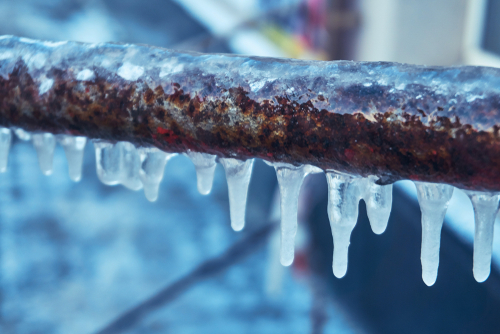Hazel Johnson, Director of Home and Motor Claims at Aviva says: “Frozen and burst pipes are a serious problem and even one burst pipe can cause thousands of pounds worth of damage to someone’s home, not to mention the huge inconvenience of having to sort repairs during the height of winter. Once pipes burst, the high water pressure can flood an entire home, leading to severe structural damage that can leave a property uninhabitable for months. Escaping water can also cause problems with mould, alongside higher utility bills, damage to household contents and the loss of irreplaceable personal items.
“Preparing your pipes ahead of cold snaps is vital to protecting your property, as well as ensuring you have the right home insurance in place, so that you aren’t left out in the cold if the worst does happen.”
Aviva has issued advice on preparing pipes for plunging temperatures, and what to do if your pipes have frozen or burst.
Preparing your pipes before cold weather:
- Keep your house and pipes warm by setting your heating to come on for an hour or two, especially if you won’t be in the house for a period of time – around 13 degrees celcius will help stop pipes freezing. While it could be tempting to keep your heating off to save on energy bills, it could end up causing damage in the long run.
- Insulate exposed pipes with specialist insulation called lagging, which you can usually buy from your local DIY store. Don’t forget exposed pipes in the loft, or your cold-water tank.
- Repair leaky taps as the excess water can sit in pipes and cause damage if it freezes. Test each of your taps by turning them fully off. If any continue to drip, get them fixed.
- Know where your stopcock is. The stopcock will turn water off in case of an emergency. It is normally located under the sink, but it’s important you know where yours is.
- Turn off water when travelling. If you’re leaving your house empty for an extended period, consider turning your water off and draining the system to potentially prevent any damage while you're away.
Dealing with frozen pipes:
If you suspect you have a frozen or burst pipe, it’s a good idea to check with your neighbours that they have water first, just in case it’s a wider problem with the water supply.
- Turn off the water supply. Switch off the main water supply using your stopcock and open all the cold taps to help relieve the pressure on the frozen pipe.
- Try and locate the frozen pipe. Check the obvious places, like pipes outside or in unheated areas of your home. You could also check the flow of water from taps and toilets throughout your home.
- If you do find the frozen pipe, you can try gently thawing the affected area using a hairdryer on its lowest setting, a hot water bottle, or warm towels. Never use a blowtorch or heat gun, as this can damage the pipe.
- Call your home insurance or a plumber. It isn’t always easy to identify when a pipe is frozen. In most cases, it’s a good idea to call your home insurer or a reputable plumber for help.
- Be careful if you’re tempted to try DIY plumbing. If you do decide to tackle a frozen or burst pipe by yourself, it could lead to further damage that might not be covered by your home insurance.
-
Dealing with a burst pipe:
- Check your pipes after a cold snap, especially in hard-to-reach places such as the loft, or in the garage. Catching a burst pipe early can protect your home from more damage.
- Turn off the main water supply using the stopcock. You may also need to turn off the cold-water tank. Doing this should help reduce the amount of flooding the burst pipe causes in your home.
- Drain the system by turning on all your cold taps and letting the water in the system completely drain away. Once the water has finished draining, turn taps off again. Flushing all your toilets will also help drain the water.
- Make sure your electrics are safe. If there’s any chance that your electrics are wet, turn off the power at the mains and call a qualified electrician for help.
- Soak up any water you can see. Use towels if the leak is small, or buckets if water is coming through the ceiling. If your ceiling starts to bulge, it may be at risk of collapse, and you'll need to call a professional to check the damage.
- Call your insurer as soon as possible to get advice on what to do next. You should take photos of any damage to your home or belongings.
We're excited to announce that we're working on building a shiny new website for readers of Landlord Today! As part of this process, commenting on articles will be temporarily disabled. We look forward to sharing our new and improved Landlord Today website with you shortly!








.png)

(1).png)




